Your skin is more than just a surface—it’s a reflection of your overall health, a canvas that tells the story of how you care for your body and mind. Radiant, glowing skin isn’t about chasing trends or slathering on expensive creams. It’s about embracing simple, natural habits that nourish you from the inside out. In this comprehensive guide, we’ll explore 10 practical, easy-to-follow steps to help you achieve that coveted glow. From hydration to mental wellness, each tip is designed to fit into your daily life, offering a holistic approach to skin health. Let’s dive into the journey of unlocking your skin’s natural brilliance, with clear explanations, actionable advice, and a touch of inspiration to keep you motivated.
Why Glowing Skin Matters
Before we jump into the steps, let’s talk about why glowing skin is worth the effort. Your skin is your body’s largest organ, acting as a protective barrier, a temperature regulator, and a visible indicator of your health. When your skin looks vibrant—clear, smooth, and radiant—it signals that your body is well-nourished, hydrated, and balanced. But dullness, breakouts, or dryness can point to imbalances, whether from poor diet, stress, or lack of care.
Achieving glowing skin isn’t just about vanity. It’s about feeling confident, healthy, and energized. Plus, the habits that lead to great skin often improve your overall well-being, from better digestion to a calmer mind. This article offers a roadmap to radiant skin through 10 accessible steps, each backed by science and practical wisdom. Whether you’re a busy professional, a parent, or a student, these tips are designed to be simple, sustainable, and effective.
1. Drink Water – Your Skin Needs It
Water is the foundation of glowing skin. Water plumps up skin cells, removes waste, and keeps skin stretchy. Dehydration, on the other hand, can make your skin look dull, flaky, or tired. To keep your skin hydrated, aim to drink 2-4 liters of fluids daily, adjusting based on your activity level, climate, and body size. For example, if you exercise or live in a hot climate, you’ll need closer to 4 liters.
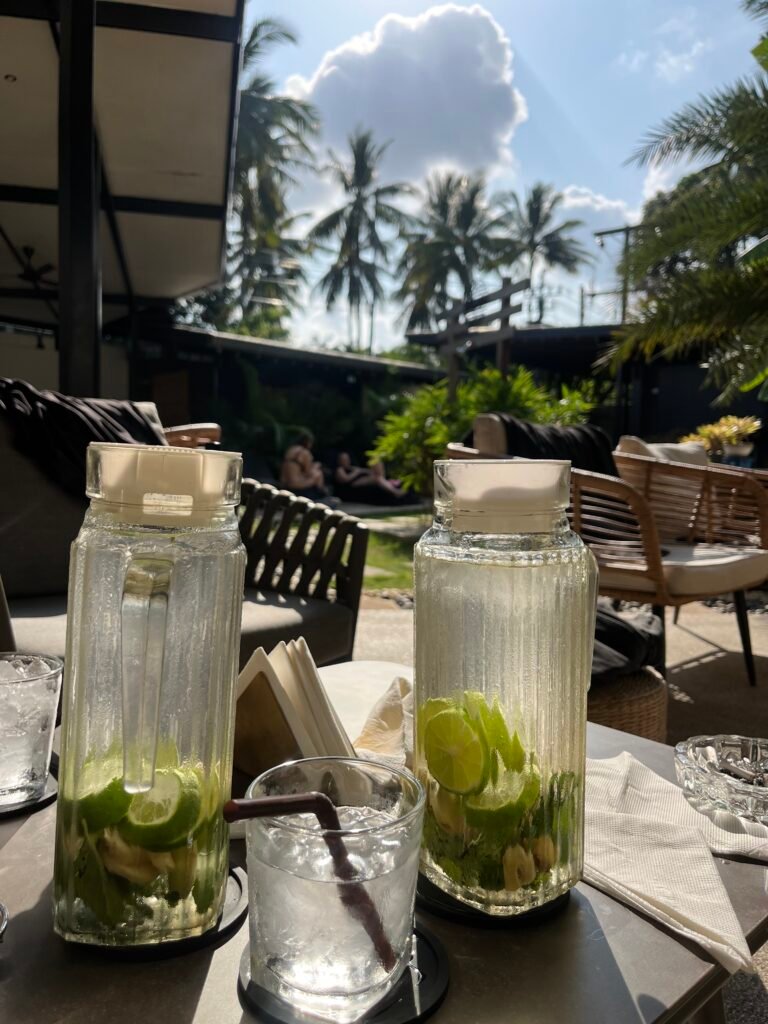
Not all fluids are equal, though. Here are some skin-friendly options to mix into your day:
- Water: The ultimate hydrator, free and accessible. Keep a reusable bottle handy to sip consistently.
- Herbal or Green Tea: Packed with antioxidants called polyphenols, which protect skin cells from damage caused by free radicals (harmful molecules from pollution or UV rays).
- Coconut Water: A natural source of electrolytes like potassium, it hydrates deeply and adds a refreshing twist.
- Pomegranate Juice: Rich in vitamin C and anthocyanins, it supports collagen production and fights signs of aging.
How to Make It Work: Start your day with a glass of water before coffee or breakfast. Set reminders on your phone to drink every hour, or flavor your water with lemon or cucumber for variety. If you struggle to hit 2 liters, try sipping through a straw—it makes drinking more fun and effortless.
Why It Matters: Proper hydration ensures your skin stays moisturized from within, reducing the need for heavy creams. Water also helps blood flow, bringing good stuff to your skin for a natural shine.
2. Load Up on Nutrient-Rich Fruits
Fruits are nature’s gift to your skin. They’re bursting with vitamins, minerals, water, and antioxidants that nourish your skin and fight damage. Eating a variety of fruits daily can improve skin texture, reduce inflammation, and even slow aging. Here’s a lineup of skin-superstar fruits to include in your diet:
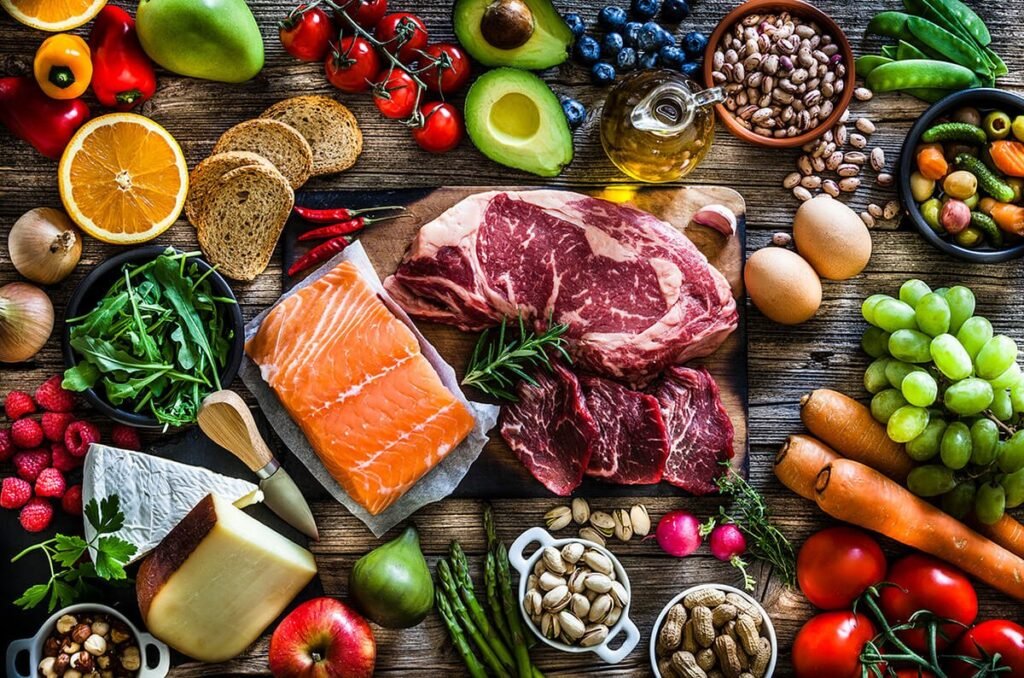
- Kiwi: High in vitamin C, which boosts collagen for firm, youthful skin.
- Apples: Contain pectin, a fiber that supports gut health, plus antioxidants to protect skin.
- Papaya: Has enzymes like papain that exfoliate dead skin cells, revealing a brighter complexion.
- Bananas: Provide potassium and vitamin B6 for hydration and skin repair.
- Cherries, Blueberries, Strawberries: Loaded with antioxidants like anthocyanins, which reduce wrinkles and redness.
- Pineapple: Contains bromelain, an enzyme that fights inflammation and soothes skin.
- Watermelon: Hydrates with 92% water content and delivers lycopene, a skin-protecting antioxidant.
- Pomegranate: Helps skin heal and renew itself naturally.
Aim for 2-3 servings of fruit daily. Blend a smoothie with berries and bananas for breakfast, snack on sliced apples with nut butter, or toss kiwi and pomegranate seeds into a salad. Frozen fruits are just as nutritious and great for convenience.
Why It Matters: Fruits provide essential nutrients that repair skin damage, hydrate cells, and fight oxidative stress. Their natural sugars are a healthy alternative to processed sweets, keeping your skin clear and radiant.
3. Boost Your Gut with Fermented Foods
Your gut is the secret star behind healthy skin. A healthy gut absorbs nutrients efficiently, fights inflammation, and keeps your body in balance. When your gut is off—say, from poor diet or stress—your skin can suffer with acne, redness, or dullness. Fermented foods are packed with probiotics (good bacteria) that strengthen your gut, leading to clearer, healthier skin.
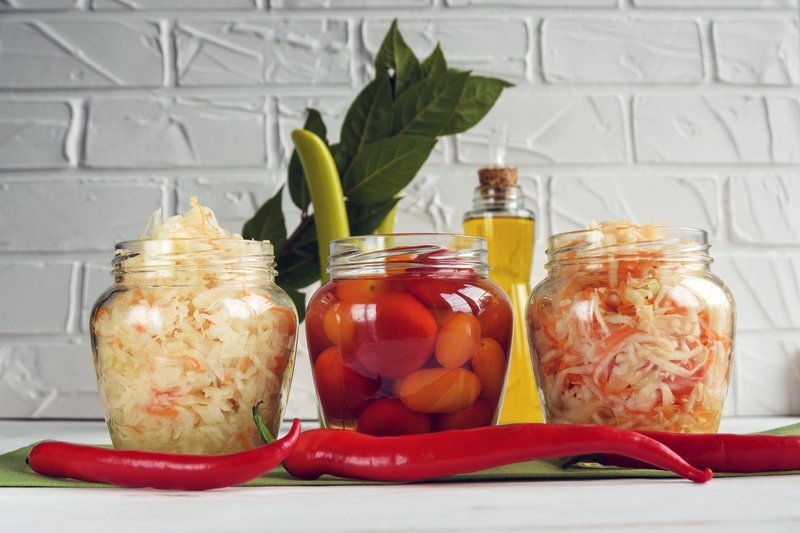
Benefits of fermented foods include:
- Nutrient Powerhouse: Packed with skin-friendly vitamins and minerals.
- Improved Digestion: Probiotics help break down food, so your body gets more nutrients.
- Gut Protection: They restore balance to your gut microbiome, reducing inflammation that can show up as skin issues.
Try these fermented foods:
- Yogurt: Choose plain, unsweetened versions with live cultures for maximum probiotics.
- Kefir: A creamy, drinkable yogurt with even more probiotic strains.
- Sauerkraut or Kimchi: Fermented cabbage adds a tangy crunch to meals.
- Kombucha: A fizzy, probiotic-rich drink that’s a fun soda alternative.
Start small with a tablespoon of sauerkraut or a half-cup of yogurt a few times a week. Add kimchi to rice bowls, sip kombucha as a mid-afternoon treat, or blend kefir into smoothies. If fermented foods are new for you, eat a little at a time to avoid upset.
Why It Matters: A healthy gut means less inflammation and better nutrient absorption, both critical for glowing skin. Studies show probiotics can reduce acne and eczema, making fermented foods a must for skin health.
4. Practice Clean Hygiene Habits
Good hygiene is a simple but powerful way to keep your skin clear and glowing. Your skin is exposed to dirt, oil, and bacteria daily, especially while you sleep. Pillowcases and bedsheets can trap these impurities, clogging pores and causing breakouts. Change your pillowcases and bedsheets weekly to keep your skin fresh.
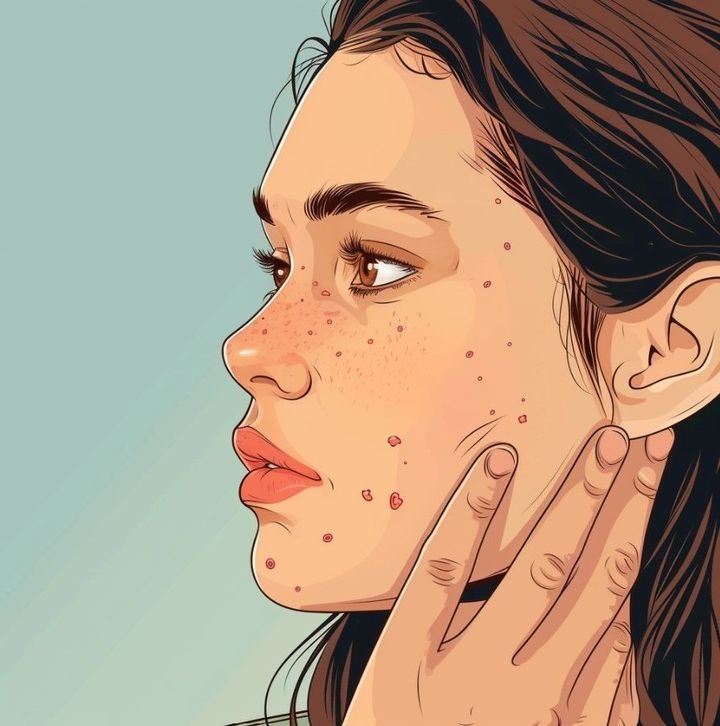
Other hygiene tips:
- Wash your face twice daily (morning and night) with a gentle, non-stripping cleanser.
- Gently dry your face with a clean towel to keep germs away.
- Clean your phone screen regularly, as it can harbor oils and germs that touch your face.
Set a weekly reminder to swap out bedding. Have extra clean pillowcases ready to swap out easily. Invest in a mild cleanser suited to your skin type (dry, oily, or combination) and make face-washing a relaxing ritual.
Why It Matters: Clean hygiene prevents pore-clogging bacteria and oil buildup, reducing acne and keeping your skin smooth. It’s an easy habit with big results.
5. Embrace the Power of Saunas
Saunas are like a mini-vacation for your skin. The heat makes you sweat, which flushes out dirt, oil, and bacteria from your pores. It also improves blood flow, delivering oxygen and nutrients to your skin for a natural glow. Plus, saunas balance your skin’s pH and support heart health, making them a win-win.

How to Use a Sauna:
- Try to do this 2-3 times a week, for 15-30 minutes each time.
- Stay hydrated by drinking water before and after.
- Start with 10-minute sessions if you’re new, and listen to your body to avoid overheating.
Check your local gym, spa, or community center for sauna access. Home saunas (like portable infrared models) are also an option if you want convenience. Shower after each session to rinse off sweat and keep pores clean.
Why It Matters: Sweating in a sauna detoxifies your skin and boosts circulation, leaving it clearer and more radiant. Research shows regular sauna use can also reduce stress, which benefits your skin indirectly.
6. Try Fasting for a Skin Reset
Fasting—going without food for a short period—can give your body a chance to reset, and your skin often reaps the rewards. A 1-3 day fast, where you consume only fluids, can reduce inflammation, clear toxins, and give your skin a refreshed, glowing look. Fasting triggers autophagy, a process where your body cleans out damaged cells, which can improve skin clarity.
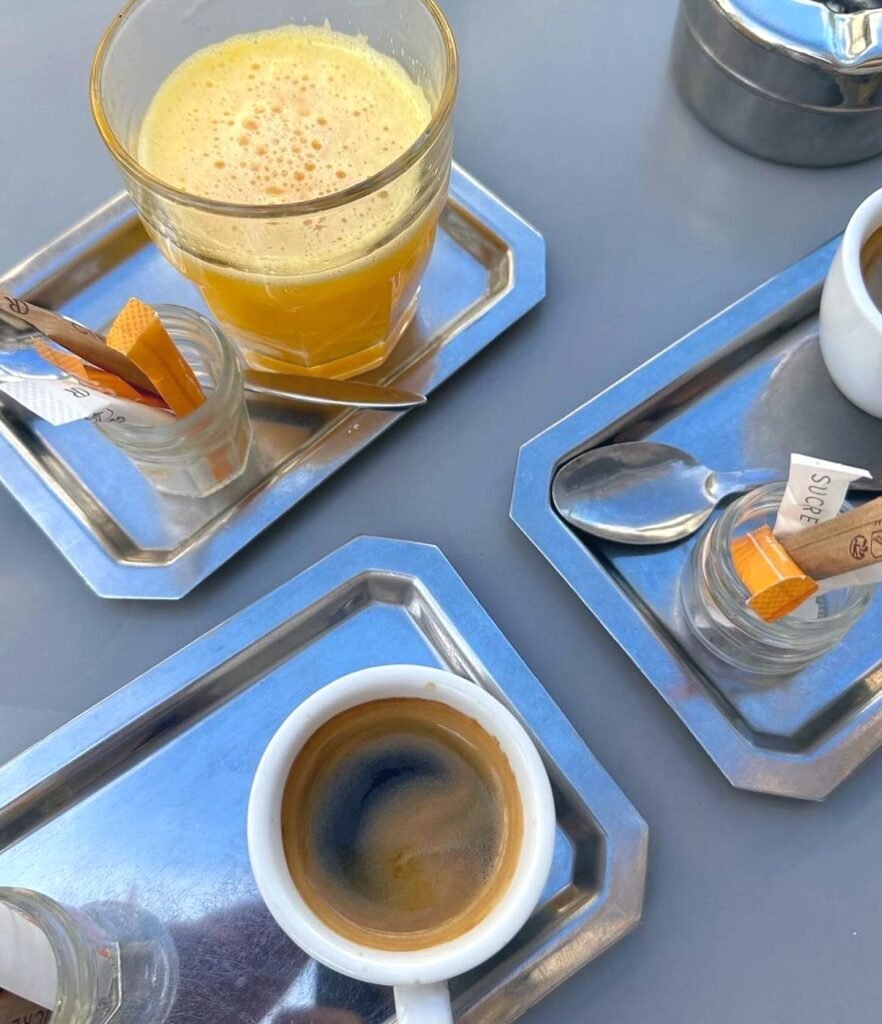
To fast safely, include:
- Electrolytes: To maintain energy and prevent fatigue.
- B12 Vitamins: To support overall health during fasting.
- Himalayan Salt: Add a pinch to water for essential minerals.
- Coconut Water: For hydration and a touch of sweetness.
Start with a 24-hour fast, drinking only water, herbal tea, or coconut water. Consult a doctor first, especially if you have health conditions like diabetes. Start with gentle foods like fruit or soup when ending your fast.
Why It Matters: Fasting reduces inflammation and gives your digestive system a break, which can clear up acne and brighten your complexion. Many people notice a radiant glow after a short fast.
7. Choose Skin Products Wisely
Your skin absorbs about 60% of what you apply to it, so be as careful with skincare as you are with food. Harsh chemicals can irritate your skin or enter your bloodstream, causing long-term issues. Avoid these common culprits:
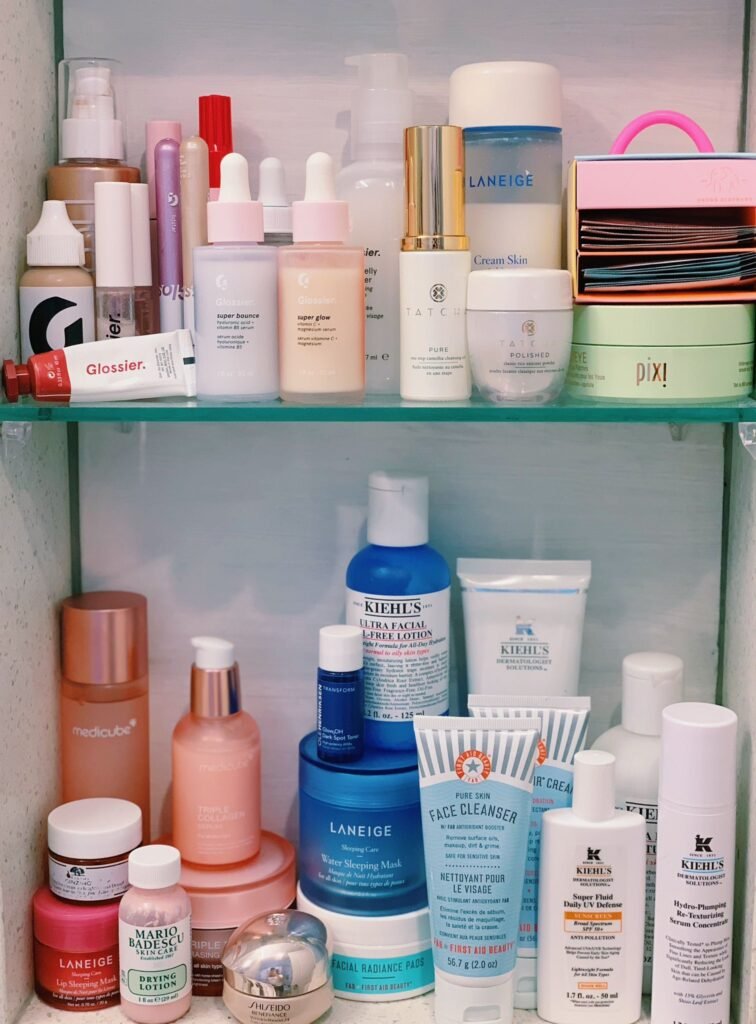
- Sulfates: Found in foaming cleansers, they strip natural oils, causing dryness.
- Parabens: Preservatives that may disrupt hormones.
- Aluminum: In some deodorants, can cause irritation.
- Phthalates: In fragrances, linked to health concerns.
- Oxybenzone: In chemical sunscreens, may trigger allergies.
Instead, opt for natural, edible ingredients like coconut oil, shea butter, or aloe vera. Easy rule: Only use skin products made with edible-quality ingredients.
Read product labels and choose “clean” brands with minimal ingredients. Try a natural moisturizer like jojoba oil or a gentle cleanser with chamomile. Try new skincare on a small area first to check for irritation.
Why It Matters: Safe skincare prevents irritation and keeps your skin healthy. By avoiding toxins, you support your body’s natural balance, leading to a clearer complexion.
8. Shower After Sweating
Exercise is fantastic for your health, but sweat left on your skin can trap bacteria, leading to acne or irritation. Shower immediately after a workout to wash away sweat, oil, and germs. Use a gentle soap to cleanse without drying out your skin.

Keep a travel-sized cleanser and towel in your gym bag for quick post-workout showers. If you can’t shower right away, use a clean towel or cleansing wipe to remove sweat until you can rinse off.
Why It Matters: Promptly removing sweat prevents clogged pores and breakouts, keeping your skin clear and smooth. Tiny effort, huge results.
9. Cut Back on Greasy, Sugary Foods
Your diet directly affects your skin. Greasy, sugary foods—like fries, soda, or candy—spike your insulin levels, which triggers your skin to produce more oil. Excess oil clogs pores with sebum (your skin’s natural oil), leading to acne. Processed foods also lack the nutrients your skin needs to stay healthy.
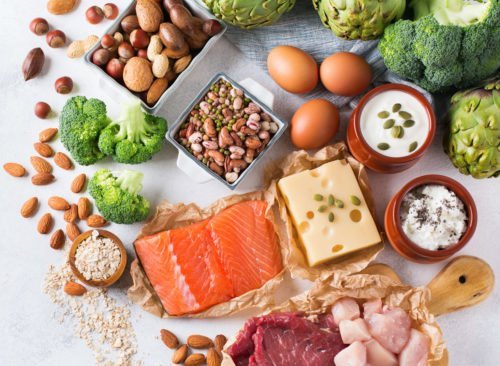
Instead, focus on whole foods:
- Vegetables like spinach, carrots, and broccoli for vitamins.
- Lean proteins like chicken, fish, or tofu for skin repair.
- Choose whole grains (quinoa, brown rice) for long-lasting fuel.
Swap sugary snacks for fruit or a handful of nuts. Cook at home more often to control ingredients, and treat yourself to dark chocolate (70% cocoa or higher) for a skin-friendly dessert.
Why It Matters: A balanced diet keeps insulin levels stable, reducing oil production and preventing breakouts. Nutrient-rich foods also fuel your skin’s repair and regeneration processes.
10. Nurture Your Mental Health
Your mind and skin are deeply connected. Stress, anxiety, or lack of sleep can trigger breakouts, dullness, or premature aging. When you’re calm and rested, your skin has a natural glow that no product can replicate. Taking care of your mental health is a powerful way to enhance your skin’s radiance.

Try these stress-busting habits:
1. Quiet Time
- Sit still for 5-10 mins
- Just breathe in and out
2. Get Moving
- Walk/stretch/dance
- Even 15 mins helps
3. Stay Connected
- Text/call someone you love
- Meet friends in person
4. Rest Well
- 7-8 hours sleep = skin healing time
- Dark, cool room works best
Fun Fact: The study of how your face reflects emotions is called physiognomy. Tiny facial movements, or micro-expressions, reveal your inner state. A relaxed, happy face naturally looks healthier and more vibrant.
How to Make It Work: Start with one small habit, like a 5-minute meditation before bed. Create a bedtime routine to wind down, and limit screen time an hour before sleep to improve rest.
Why It Matters: Reducing stress lowers cortisol (a stress hormone) that can cause acne or oiliness. A calm mind supports healthy skin cell turnover, giving you that coveted glow.
Putting It All Together: Your Glowing Skin Plan
Achieving radiant skin is about consistency, not perfection. You don’t need to overhaul your life—just pick a few steps and build from there. Here’s a simple week-long guide to start with:
- Monday: Drink 2 liters of water and eat a fruit salad for dessert.
- Tuesday: Add a spoonful of yogurt to lunch and wash your face before bed.
- Wednesday: Try a 15-minute sauna session and shower after.
- Thursday: Swap soda for herbal tea and take a 10-minute walk to de-stress.
- Friday: Change your pillowcase and try a natural moisturizer.
- Saturday: Do a 24-hour fast (if cleared by your doctor) with coconut water.
- Sunday: Cook a veggie-packed meal and meditate for 5 minutes.
Track how your skin feels after a week. As these habits become second nature, add more steps, like cutting sugary snacks or visiting a sauna regularly. Celebrate small wins—like clearer skin or a brighter complexion—to stay motivated.
Common Skin Myths Debunked
As you work toward glowing skin, you might hear conflicting advice. Let’s clear up a few myths:
- Myth: Expensive products guarantee great skin.
Truth: Simple, natural habits like hydration and diet often work better than pricey creams. - Myth: Oily skin doesn’t need moisturizer.
Truth: All skin types need hydration—choose a lightweight, non-comedogenic (won’t clog pores) moisturizer. - Myth: You can’t change your skin type.
Truth: While genetics play a role, diet, hygiene, and stress management can improve how your skin looks and feels.
Troubleshooting Skin Issues
If you’re following these steps but still facing skin challenges, consider these tips:
- Acne: Check your diet for sugary or greasy foods, and ensure you’re washing bedding weekly.
- Dryness: Increase water intake and use a natural oil like jojoba to lock in moisture.
- Redness: Try fermented foods to reduce inflammation, and avoid harsh skincare ingredients.
- Dullness: Add more fruits and consider a sauna session to boost circulation.
If issues persist, consult a dermatologist to rule out underlying conditions like eczema or hormonal imbalances.
The Science Behind Glowing Skin
For those curious about the “why” behind these tips, here’s a quick look at the science:
- Hydration: Water supports skin cell function, preventing dryness and aiding toxin removal (Journal of Clinical and Aesthetic Dermatology, 2018).
- Fruits: Antioxidants like vitamin C and lycopene neutralize free radicals, protecting skin from aging (Nutrients, 2020).
- Fermented Foods: Probiotics reduce systemic inflammation, improving acne and eczema (Frontiers in Microbiology, 2019).
- Saunas: Heat increases blood flow, delivering nutrients to skin cells (Mayo Clinic Proceedings, 2018).
- Fasting: Autophagy during fasting clears damaged cells, enhancing skin clarity (Nature Reviews Molecular Cell Biology, 2019).
- Mental Health: Lower cortisol from stress management reduces oil production and breakouts (Journal of Investigative Dermatology, 2017).
These studies confirm that small lifestyle changes can transform your skin over time.
Your Journey to Radiant Skin
Glowing skin is within your reach, and it starts with treating your body like the incredible system it is. These 10 steps—hydration, fruits, fermented foods, hygiene, saunas, fasting, smart skincare, post-workout showers, a balanced diet, and mental wellness—offer a holistic path to radiance. They’re not about quick fixes but about building habits that make you feel vibrant inside and out.
Start small. Pick one or two tips that excite you, like drinking more water or trying a new fruit. Notice how your skin responds, and let that inspire you to keep going. Your skin is a reflection of your health, and by caring for it naturally, you’re investing in a happier, healthier you.
